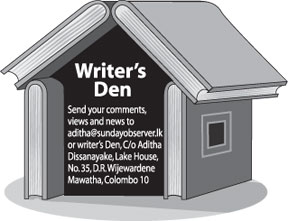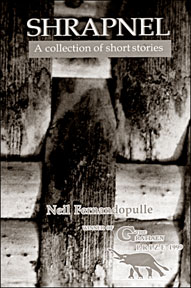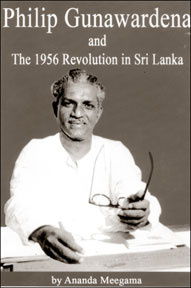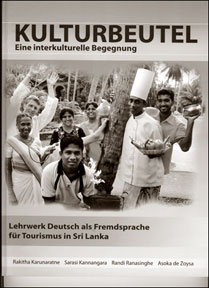|

Bleak but brilliant
Reviewed by Sajitha Prematunge
[email protected]
It’s said that one can’t judge a book by the cover. But as the back
cover of this particular book had promised it is not about war, peace,
love, loss, discovery, disillusionment, passion, remorse, trees and the
sky, here and the tomorrow, it is indeed about all these and more.
Shrapnel by Dr. Neil Fernandopulle is made up of a milieu of themes and
diverse subject matter.
|

Shrapnel by Dr. Niel Fernandopulle |
From the first story to the last Shrapnel is a real page turner.
Reading the collection, one gets the impression that the objective of
the writer was to make a statement. If so Abuse, is a fitting opening to
the collection. A real eye opener, the story provides a narration
through a turn of events. No judgement is passed, allowing the reader to
come to their own conclusions.
At the same time the tone seems eerily distant, detached and devoid
of emotional melodrama - something akin to western short stories and
novels. But the truth exposed, torments you and leaves you thinking.
The stories are not sensationalised but are just as attractive as any
sensationalised bestseller. The writer examines every issue in a
different angel.
For instance Afterglow is - not about post traumatic stress disorder,
there are no gruesome images of war, no flashbacks of bombs exploding -
but the after effects of all these on a soldier, an amputee; a different
side of war not seen by many. While most talk of the bravery of the
soldier, the writer analyses how a soldier regards this honour bestowed
upon him.
Here is a successful presentation of war in different perspectives -
the perspective of the injured soldier, detached foreigner, border
village farmer, etc... It is impossible not to feel that the writer is
preoccupied with war.
In fact all the short stories included in the collection are
tragedies, mostly of war leading to a bleakness underlying the whole
collection. It leaves the reader with a sense of loss and sadness, yet
craving for more.
In Here and tomorrow the writer provides a somewhat futuristic
approach to war. It makes one wonder whether the writer has lost sight
of why this particular war is fought.
It is clear that the subject matter is intensely researched. The
writer is very conversant with social issues such as war, ethnic
violence, abuse, political upheavals, etc... Even his descriptions of
the village culture does not seem fabricated or laboured. In fact his
narration is very convincing and seems authentic, for example how Banda
sits on the steps cleaning his teeth in Misbegotten.
“Banda sat squatly on the lower step of the pair of long cement steps
which skirted the verandah like a pair of forlorn lips.” Born and bread
in Colombo, it is amazing, with how much ease the writer describes rural
village life in Sri Lanka.
A molecular biologist by profession it is surprising that he had not
attempted to include a science fiction in the collection. The only story
in Shrapnel that is even remotely related to science is Seed dispersal
patterns of the Dipterocarps of Sri Lanka. In Crack in the mirror the
writer openly criticises the blind faith of the people and the hypocrisy
of religious leaders.
This and The Council meeting are representative of the writer’s
boldness in making a statement, whether political or social. Misbegotten
indicates the power play of politics, presented in a detached manner -
devoid of the drama of an assassination around which the story is woven.
The writer is successful because he is equally competent in first
person and second person narrations. And his diction is peppered with
Sinhala words without reservation. Guru gedara, jathiya, yakko, pola,
upasaka, wesak and Hunga are some of the examples.
The title ‘Du’ gives universal meaning to the Sinhala equivalent of
‘daughter’ while also making it impersonal. The names of the stories
provide no insight into the stories. They give nothing away, in stead
only help to heighten curiosity.
The dialogues and narration are never confused - even without the
inverted commas - because the dialogues represent the characters so well
and the narration the narrator. The stories are rich with imagery. The
injured water bug which symbolises the injured soldier in Afterglow and
the screw beetle which signify decay are apt images that exemplify the
ingenuity of the writer.
The diversity in the collection gives the impression that the stories
were written during a long period of time. The characters involved
include people in all walks of life. Almost no social strata is left
out. It is in deed a pity that the writer hasn’t written in over four
years. But almost a decade after it was written Shrapnel is still a good
read. Who says you can’t judge a book by the cover.
Road to victory
Reviewed by W. T. A. Leslie Fernando
This volume is an indepth study to trace the road to the 1956
elections and the unprecedented victory of the MEP and its years in
office through the political life of one of the main protagonists Philip
Gunawardena and through his speeches in the House of Representatives.
 At the outset the author confesses that the 1956 MEP victory and its
achievements are generally identified with S. W. R. D. Bandaranaike,
great was his contribution, the other leaders and movements crucial to
the victory are quite often submerged with myth and legend associated
with S. W. R. D. and 1956. At the outset the author confesses that the 1956 MEP victory and its
achievements are generally identified with S. W. R. D. Bandaranaike,
great was his contribution, the other leaders and movements crucial to
the victory are quite often submerged with myth and legend associated
with S. W. R. D. and 1956.
He emphasises that the book is an attempt to rectify this imbalance
and bring out the vital contribution of Philip Gunawardena in particular
to this victory and to the political and social transformation that took
place in the country thereafter.
The volume is divided into two sections. The first part deals with
Philip Gunawardena’s education abroad, the formation of the LSSP, his
incarceration in jail and escape to India, his stand during the
conflicts of party in 1940’s, his break up with the LSSP to form the
VLSSP and then his alliance with S. W. R. D. Bandaranaike to form the
MEP leading to 1956 election.
It also surveys the work done by the MEP in 1956-59 period in
particular the two VLSSP Ministers Philip Gunawardena and William de
Silva and events that led to their resignation from the government.
The second part contains Philip’s speeches in the House of
Representatives from 1947 to 1959. The speeches indicate that although
Philip has been strongly influenced by the theories he studied during
his Marxist years, he was attempting to evolve and apply solutions
vis-a-vis Sri Lankan conditions, operating on economic principles based
on democratic and socialist tenets.
Throughout this book one finds that Philip has always tried to give a
new perspective to his Marxist ideas. He was always pragmatic and open
to change and that influenced his later role in Sri Lanka.
During his days with the British Communist Party Philip rejected
blind adherence to policy twists taken by the Soviet Communist Party and
became a Trotskyite. However on his return to Sri Lanka, Philip turned
away from the fundamental Trotskyite thesis of forming a vanguard party
and embarked on organising a broad non-doctrinal movement.
In 1935 under Philip’s leadership the LSSP was mass party with
parliamentary perspectives. (Page 27) During the World War II, when
Philip and other detainees escaped to India, the Bolsheviks who grasped
the control of the LSSP termed the party as petit-bourgeoisie and wanted
to form a vanguard party, elitist in nature, consisting of those well
trained in the tenets of Marx-Lenin-Trotsky.
Philip and his supporters including N. M. did not believe that such a
strategy had a chance of success specially after their experience in
India.
When they came out of prison in 1945, Philip and N. M. broke out from
the party which had now assumed the name Bolshevic Lennist Party of
India and once again reconstituted the LSSP. In 1950 when the LSSP
merged with the BLPI, Philip realised that an elitist group engaged in
theoretical hair splitting would be at the helm. Philip and his band of
followers left the LSSP and formed the Viplavakari Lanka Samasamaja
Party.
In 1950’s Philip realised that a new perspective was needed to
understand the ramifications of our society where overwhelming majority
of population lived in rural areas where social structure is textured
with religious affiliations.
In this situation specially in 1954, from being a figure subscribing
to basic Marxist tenets of the need for a dictatorship of the
proletariat, he gravitated to a position which recognised the need to go
beyond the urban working class and rural labourers and ally with other
social formations in rural Sri Lanka.
Accordingly Philip Gunawardena’s VLSSP divorced itself from the
international Marxist polemics and allied with non-Marxist parties like
the SLFP and Basha Peramuna to form the MEP. The VLSSP Ministers in the
1956-59 MEP government, Philip Gunawardena and P. H. William de Silva
forged ahead with a radical agenda. Philip made a multi-pronged effort
to regenerate agriculture through the Paddy Lands Act, the cultivation
committees, multi-purpose cooperatives and the Co-operative Development
Bank.
It is true that various amendments marred the Paddy Lands Act and the
Co-operative Development Bank did not see the light of the day.
Nevertheless Philip’s reforms in the field yielded far-reaching benefits
to the peasants. The book vividly portrays that the Ministry of
Agriculture and Food in a hectic three years under Philip brought change
and growth virtually to every subject under its purview.
The highest emphasis was given for programmes to increase paddy yield
and the momentum given and the infrastructure created led to
continuation by later governments. After a long period of neglect Philip
introduced a dynamism to the plantation industry by sustained
re-planting programmes. His Anti-Fragmentation Act was an important
measure taken by any government since independence to save the
plantations being auctioned off in pieces. The author quotes Felix R.
Dias Bandaranaike, a later Minister of Agriculture saying “The beginning
of agricultural growth in this country stemmed from the 56 period” to
drive home his point.
Although the book deals mainly with the life and achievements of
Philip Gunawardena, it also analyses the role of William Silva in the
1956-59 government. It was under William de Silva, that for the first
time there was a concerted policy by the government to develop industry.
With the enactment of his State Corporations Act, the government made
investments to develop basic industries like steel, mineral sands,
rubber tyres, cement, flour milling etc. whilst encouraging various
incentives saw the beginning of private industry.
The author attributes the revolution in the fishing industry as the
greatest contribution of William de Silva. Prior to 1956, the fishing
industry in our country was in a primitive state. It was during his
period that the mechanisation of the fishing industry was begun. As a
result the fish landings doubled in 1964 and trebled in 1969. The cold
room he installed at Mutwal was the first step taken to preserve fish
for planned marketing. It was also during his tenure that inland
fisheries were commenced on a wide scale by breeding Thilapiya and
Gourami fish.
Philip Gunawardena and William de Silva were the force behind the
nationalisation of bus transport and the Port. It is now generally
acknowledged that Philip’s group was responsible for most of the
progressive measures instituted in the 1956-59 MEP regime.
The author in conclusion asserts that Philip Gunawardena as the most
colourful personality thrown up by the revolution of 1956. He adds that
upto 1956 he was noted as unrelenting opponent of and country’s leading
agitator against the capitalist system and colonial domination - fiery,
impetuous and indomitable. After 1956 he surprised everybody by his
performance as the Minister of Agriculture and Food. His clarity of
thinking, his dynamism in formulating and implementing programmes earned
him the respect of all.
The author evaluates that all in all for initiative, hard work and
successful implementation very few Ministers in Sri Lanka could match up
to his performance. The names he could think in this respect are C. W.
W. Kannangara in education, D. S. S. Senanayake in land settlement and
irrigation and R. Premadasa in housing. Here again the author identifies
that others had 15 to 20 years to show their colours. Whereas Philip
Gunawardena could wield his impact only in three years.
As usual Dr. Ananda Meegama presents this volume in his inimitable
languages and style that provides fascinating reading so that the work
consisting of 580 large pages could be read from beginning to end
without being tired. The large number of photographs connected to Philip
Gunawardena and William de Silva enhances the values of the book and it
bears an attractive cover as well. This volume is a treasure not only to
the students in politics but also to all interested in our political
history.
Baggage of culture from Germany
Reviewed by Indeewara Thilakarathne
[email protected]
Kulturbeutel or baggage of culture is the first textbook for teaching
German in Sri Lanka for those who are involved in the hospitality
industry.
It is a collaborative project of the Goethe-Institute Sri Lanka and
the German Section of the Department of Modern Languages, University of
Kelaniya.
 The project was founded by the Tsunami Relief Programme of the
Foreign Ministry of the Federal Republic of Germany. The publication is
timely as Sri Lankan is recovering from Tsunami. Germans make up a large
chunk of the tourists who visit annually to taste the country’s
hospitality and the German conversant employees in the hospitality
industry is a log-felt need as tourism provides livelihood of thousands
in the coastal area which hard hit by the Asian Tsunami. The project was founded by the Tsunami Relief Programme of the
Foreign Ministry of the Federal Republic of Germany. The publication is
timely as Sri Lankan is recovering from Tsunami. Germans make up a large
chunk of the tourists who visit annually to taste the country’s
hospitality and the German conversant employees in the hospitality
industry is a log-felt need as tourism provides livelihood of thousands
in the coastal area which hard hit by the Asian Tsunami.
However, the focus of teaching of German in Sri Lanka was on making
students fit for Germany. A significant departure from the present text
book is that it is tailor-made for those who engage in hospitality
industry. As the book is set against Sri Lanka and is authored by a team
of Sri Lankan teachers of German, students encounter familiar landscape
of human activities in Sri Lanka in the context of tourism.
Teachers have paid special attention on imparting students with
practical knowledge of German so as to enable them to interact with
visiting German tourists. The course material will enable students to
handle day-to-day situations with German speaking tourists. In addition
to the text, written and oral exercises have been included to improve
students’ pronunciation and intonation that are inherent to German
language.
The special feature of Kulturbeutal is the intercultural aspect known
as “Begegnungen” which will explain in clear terms the cultural
difference between Sri Lanka and Germany and mentalities of Germans. The
book also gives some useful tips to avoid intercultural
misunderstandings.
A significant characteristic of the textbook is that it has taken a
interactive approach in designing the texts with full of conversations
that will not only teach key words but also their usages specially in
context of hospitality industry.
The book is constructed on the interesting visit of German family
Hartmann and around the country journey that readers travel along the
fascinating cultural landscape of Sri Lanka.
Hartman encounters day-to-day situations that tourist might encounter
in a host country. The book also trains students in application of
knowledge in practical instances such as filling visa application in
German and also offers a comprehensive glossary in Sinhala and Tamil
along with German words. Kulturbeutel was developed by a team of
academics teaching at the Goethe-Institute Sri Lanka and the Department
of Modern Languages, University of Kelaniya. Rakitha Karunaratna, Randi
Ranasinghe, Dr. Asoka de Zoysa and Heidi Steiner of German Academic
Exchange Service (DAAD) make up the team of authors while the project
was coordinated by Rudiger Punzet (Goethe -Institute Sri Lanka/Tsunami
Relief Programme).
The Kulturbeutel offers a window of opportunity for prospective youth
aspiring to enter the hospitality industry in a professional manner and
employees already in the hospitality industry can also improve their
knowledge and skills in the use of German language by following the
course.
The team of authors should be congratulated for producing an
excellent work with specific emphasis on Sri Lanka and Sri Lankan
hospitality industry.
By ways : Long and Short
A collection of Sinhala Poetry by Tanuja Dharmapala, is being
translated to Tamil and English. This collection of Poetry - Byways:
Long and Short” which included Tamil and English poems will be launched
on 12th July 3.00 p.m. at AGKO centre (Blackpool) Nuwara Eliya.
The English translation is by Professor Sunanda Mahendra; the Tamil
translation is by Saminadan Wimal (Senior Lecturer - Jaffna University).
The line drawings, which were inspired by this collection is by
Shantha K. Herath. A composition of music, based on these poems and a
recitation will be presented by Kapila Poogalaarrachchi and Nelu
Adhikari.
Manubandu Vidyapathy will create a choreographic piece inspired by
the poem. A collection of photography, based on these poems created by
Sudam Gunasinghe will also be shown as a film.
All these different art forms will fuse to create a new dimension in
cultural understanding and art appreciation at this event. Among the
contributors - to this special art event are Sinhala, Tamil and Muslim
communities.
The poetry collection will be launched among the Sinhala and Tamil
communities in the Uva district with special guests.
This special event is open to all art lovers of Nuwara Eliya. |
